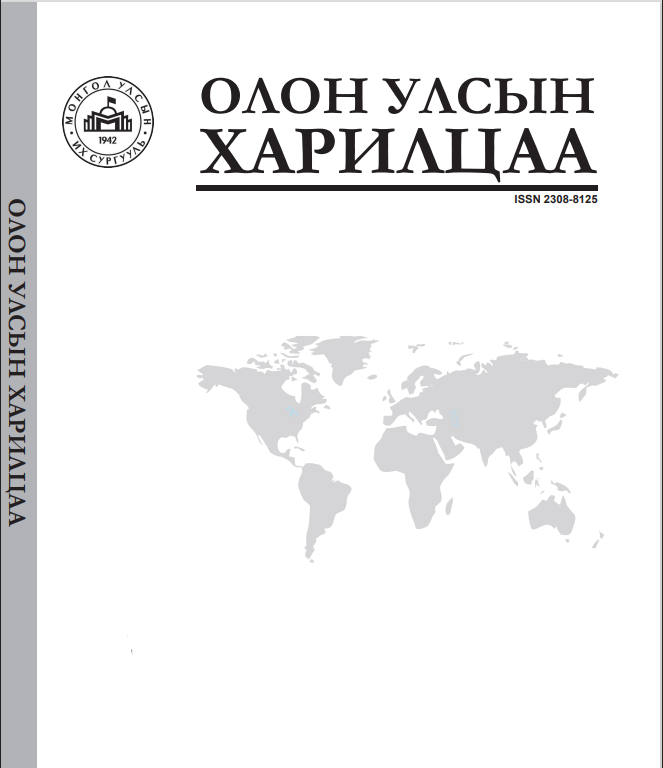АНУ-ын гадаад бодлогын шийдвэр гаргалт: Конгресс ба улс төрийн намуудын үүрэг, оролцоо П.Мягмардорж
Main Article Content
Abstract
This research paper aims to determine the position of the Congress, which is mainly involved in making foreign policy decisions of the US, and the political groups working together within the framework of the two main parties, the Republican Party, and the Democratic Party, on foreign policy issues. Among the factions within the Republican Party, the "Neoconservatives" and the "Hardline Conservatives" advocate a more rigid stance on foreign policy decision-making, even the use of military force to protect the nation's interests. However, the 'Trumpists' were formed later in this party, take a different position from the previous two groups in some cases Republican Isolationists take the position of isolating the United States from world politics, and the Traditional Internationalists take the United States to an active position in world politics. Among the groups of the Democratic Party, the Liberal Internationalists are expected to protect the interests of the United States by creating and confirming the international collective security system, and today, the group occupies a significant position in the country's decision-making. Thus, by defining the position of the political group that plays a key role in US foreign policy decision-making, what position does Mongolia take when communicating with the country's influential politicians and other politicians, diplomats, and researchers within their "third neighbor policy", it is possible to predict what foreign policy concepts they will adhere to in dealing with other countries.
Downloads
Article Details
References
"War and International Law: America’s Foreign Policy: A Brief History”. (2018). Constitutional Rights Foundation: http://www.crf-usa.org/war-in-iraq/foreign-policy.html
A. F. Gilman. (2019). "The Origin of the Republican Party". Wisconsin Historical Society: https://wisconsinhistory.org
Biden, S. J. (2000). “A Democratic viewpoint: Congress and Foreign Policy”. U.S Foreign Policy Agenda. An Electronic Journal of the Department of State, Volume 5, 16-19.
Erlanger, S. (2009, оны October 9). "Barack Obama Wins Nobel Peace Prize". The New York Times.
Gordon, P. E. (2018). The Authoritarian Personality Revisited: Reading Adorno in the Age of Trump. W. In Brown, P. E. Gordon, & M. Pensky-Д, Authoritarianism: Three Inquiries in Critical Theory (хууд. 160). Chicago: Chicago: University of Chicago Press.
Kaplan, E. (2006). “U.S Political Parties and Foreign Policy”. Council on Foreign Relations.
Kristol, I. (2003 оны August 25). “Neoconservative Persuasion”. The Weekly Standard.
Lowndes, J. (2019). Populism and race in the United States from George Wallace to Donald Trump. C. (. In de la Torre-Д, Routledge Handbook of Global Populism (хуудсд. pp. 197–200). London & New York: London & New York: Routledge.
Masters, J. (2017). “U.S. Foreign Policy Powers: Congress and the President,” . The Council on Foreign Relations.
May, C. D. (2023 оны August 22). Foundation For Defence of Democracies. Foundation For Defence of Democracies:
https://www.fdd.org/analysis/2023/08/22/the-problem-with-republican-isolationism/
National Security Strategy. (2002). www.state.gov: https://www.state.gov/documents/organization/63562.pdf
Nixon and the War Powers Resolution. (2017). Bill of Rights Institute: https://billofrightsinstitute.org/educate/educator-resources/lessons-plans/presidents-constitution/war-powers-resolution
Steven, W. (2002 оны april 13). Editorial Observer; President Bush and the Middle East Axis of Ambiguity”. The New York Times.
The Constitution of the United States. (1798). constitutionus.com: http://constitutionus.com

